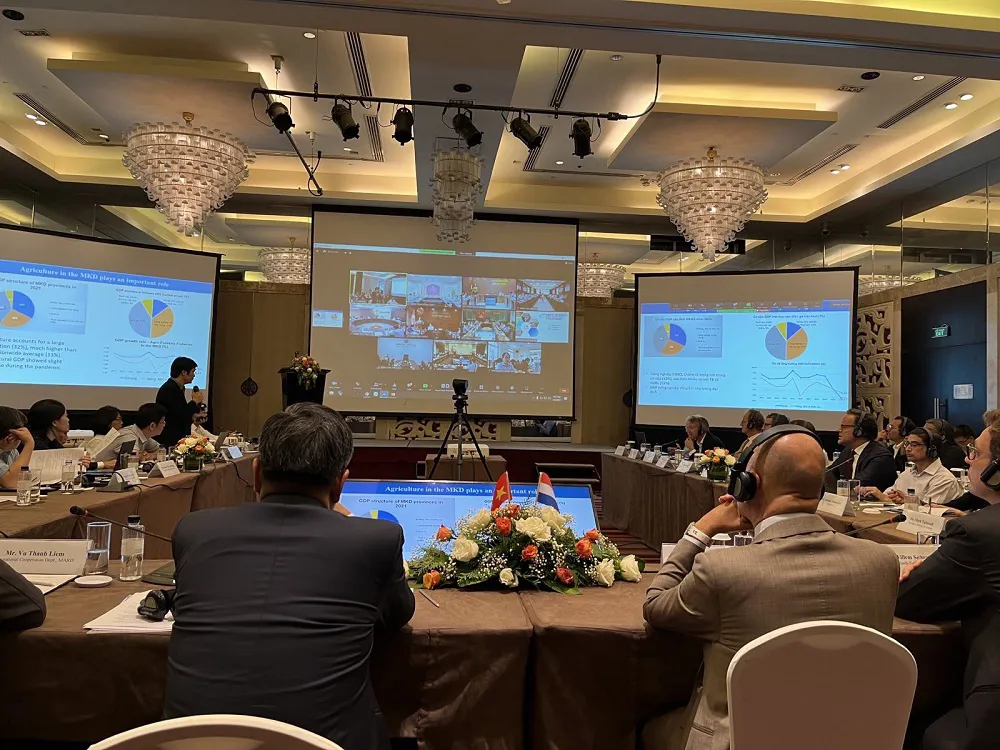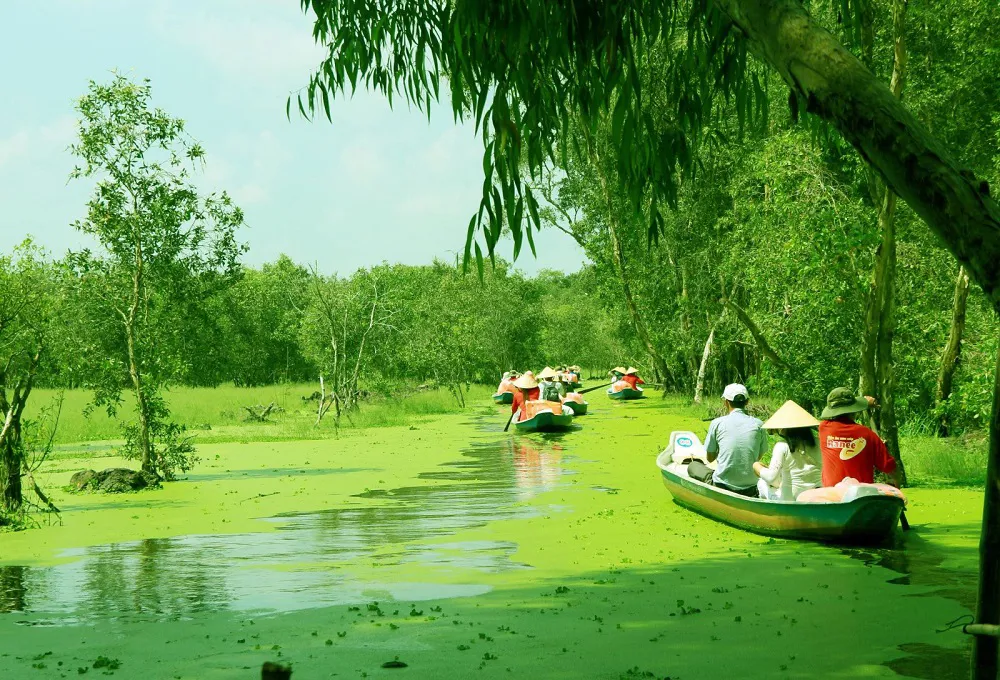Joint forces boost sustainable transformation in Mekong Delta
Experts from the Netherlands and international partners in Vietnam highlighted the role of green, resilience, and inclusion in the Mekong Delta's transformative framework.
International and domestic experts on September 6 discussed measures for better planning and potential interventions in the Mekong Delta of Vietnam for a sustainable transformation of the region, which is hardest hit by climate change.
| Participants at the event held in Hanoi on September 6. Photo: The Netherlands Embassy in Hanoi |
The discussions were aimed at providing a “helicopter view” to address opportunities, challenges as well as priority and focus of different stakeholders at the roundtable dialogue held in Hanoi, with the participation of representatives from different ministries, Mekong Delta provinces, Dutch delegation and relevant international partners in Vietnam.
Working as stakeholders in the region, Dutch experts shared major contributions of the Netherlands to the Agricultural Transformation in the Mekong Delta through water-agro scientific advice and the development of agro-business hubs.
At the dialogue, Dr. Gerardo van Helsema, Dr. Peter Smeets, and Martijn van de Groep covered issues related to policies and activities in the Mekong Delta; science policy business interface; and recommendations for sustainable transformation.
Dr. Gerardo van Helsema dealt with water and agricultural challenges; agricultural training programs; saline coast; saline intermittent zone; fresh upper zone; and fostering higher value production and agribusiness.
Specifically, he reached ways to match future agricultural development to changing agro-hydrological landscape; saline coast with sustainable aquaculture and coastal protection; saline intermittent zone focusing on salt-tolerant and mixed aquaculture with no groundwater use to ensure eventual freshwater storage for the cultivation of rice, fruits, and veggies.
Martijn van de Groep, presented issues that help support the sustainable and climate-resilient development of the Mekong Delta, allowing exchange, co-evaluation, and joint construction of data, knowledge, and information.
The purpose is to contribute to evidence-based policy (decision) making with regard to implementing the Mekong Delta Regional Masterplan; the MARD Masterplan for Sustainable Agriculture in the Mekong Delta; and related sectoral masterplans for water resources management, transportation and logistics, urban development. At the same time, it contributes to developing and implementing an innovation agenda for the private sector to promote sustainable socio-economic development.
Meanwhile, Dr. Peter Smeets, in generic projects, recommended participative planning engaging with the future changes in the agrifood production with regard Ho Chi Minh City and the Mekong Delta as one integrated metropolitan area; elaborating an agro-logistic vision and an additional investment plan for the whole area; preparing a participatory planning authority to guide the transformation of the agri-food sector in the area; and paying attention to the position of subsistence and small farmers in the ongoing transformation and training their professional skills.
In specific projects, his recommendations focus on defining and elaborating a pilot project for a combined general purpose agropark and consolidation center; elaborating a pilot project for the production of fruit and vegetables in closed high-tech greenhouses; and elaborating a pilot project for large-scale cultivation of fish and shellfish in closed Recircular Aqua Systems (RAS).
| Mekong Delta is expected to be an ideal tourist attraction. Photo: VNA |
Total engagement for sustainable transformation
The Dutch expertise caught the attention of the participants who agreed that it would be helpful for Vietnam in master planning and decision making for the Mekong Delta, the region produces 50% of the country’s total rice, 65% of aquaculture, 60% of fish for export, and 70% of fruits.
At the event, contributions by ministries, the World Bank, and the Asian Development Bank were also made.
The Ministry of Planning and Investment agreed that by 2050, the Mekong Delta will become an attractive destination for tourists and investors; of well-preserved wetland ecosystems, natural resources and rich and diverse cultural identities for sustainable socio-economic development.
In a government decision, the region will become a dynamic development area by 2030 with a focus on forms of ecotourism. To make the goal possible, it requires effective agricultural economy, investment in infrastructure, and coordinating the implementation of the regional planning, according to Dinh Trong Thang, Director General of MPI’s Department of Planning Management.
Meanwhile, Tran Cong Thang, Director General of the Institute for Policy and Strategy for Agriculture and Rural Development (IPSARD) under the Ministry of Agriculture and Rural Development (MARD) highlighted the role of agricultural transformation, giving key solutions for the sustainable development, namely integrated plan for the sustainable development; increasing investment; developing cooperative economy; forming specialized farming areas; training manpower; promoting services and processing industry; developing market and supply chains; improving climate adaptation capacity, and establishing supporting units for better decision-making.
Coinciding with MARD’s idea, representatives from the Ministry of Industry and Trade (MoIT) stressed the importance of logistics, calling it crucial factor in tackling the region’s problems. For that reason, Nguyen Thi Quynh Van and Lai Hong Minh from MoIT’s Institute of Strategy and Policy for Industry and Trade said it’s necessary to have policies on drawing investment in logistics; building multimodal transport; investing in logistics for agricultural products; training manpower; and having inter-ministerial connections for regional management.
Water resources become indispensable issues in the region of 3.94 million hectares. In this regard, Dr. Nguyen Anh Duc, Water Resources Institute, the Ministry of Natural Resources and Environment (MONRE) pointed out key challenges facing the Mekong Delta, which include Chinese hydropower dams; downstream hydropower dams (Mainstream and tributaries); inter-basin and intra-basin water diversion; water use for irrigation, industry and domestics; waterway infrastructure; deforestation; sand mining; and regional climate change.
Experts from the World Bank (WB) and the Asian Development Bank (ADB) also contributed to the regional sustainability by providing regional master plan with a clear vision for sustainable development.
Dinesh Aryal, Senior Environmental Specialist, WB, and Shige Sakaki, Senior Transport Specialist, WB, included green, resilience, and inclusion in transformative framework for the Mekong Delta.
Accordingly, green growth requires restoration of lost flood absorption and aquatic habitat in
the floodplains; water and land pollution control, improved environment and ecology; increased mangrove coverage and preservation of biodiversity and fisheries; transition toward low-carbon production practices; green production and branding of products and services, green jobs; and green transport rand logistics.
"At the same time, resilience should be formed by reduced cost of flood, drought, salinization, riverbank and coastal erosion; diversification of income generation and economic opportunities; strengthening value-chain integration; mitigation of further land subsidence; and resilient transport and logistics," Dinesh Aryal said.
The last but not least, it needs improved living conditions, incomes and resilience of the poor/“near poor” people who are most vulnerable to external shocks; improved farmers’ capacity; access to basic services for all; improved skills and economic opportunities of local labor; and private sector participation."
The World Bank’s measures are aimed at GDP growth at 6.5% per annum by 2030 in the region, making it a sustainable agricultural economic center with high productivity and efficiency.
To join with the Government of Vietnam, the Netherlands Embassy, and the WB, the Asian Development Bank (ADB) addressed pipelines in the Mekong Delta, stressing on mangroves rehabilitation and sustainable management to enhance climate resilience project; essential infrastructure to support agricultural transformation to adapt to climate change in coastal areas of the Mekong Delta project; climate-smart agricultural value chain infrastructure project; and government requests ADB’s support to improve road connectivity in Mekong Delta provinces.
To proceed with the projects, Stefania Dina, Senior Natural Resources and Agriculture Specialist, ADB, and Khuc Thi Lan Huong, Senior Project Officer, ADB, stressed the need for coordination between government agencies and development partners to understand government’s need for sustainable transformation of the Mekong Delta, aligning with the Mekong Delta Master Plan and maximize synergies.
They also emphasized evidence-based (science-based) approach and spatial planning, noting that they are the key in the process, together with establishing an advisory team to inform investments preparation and implementation.











